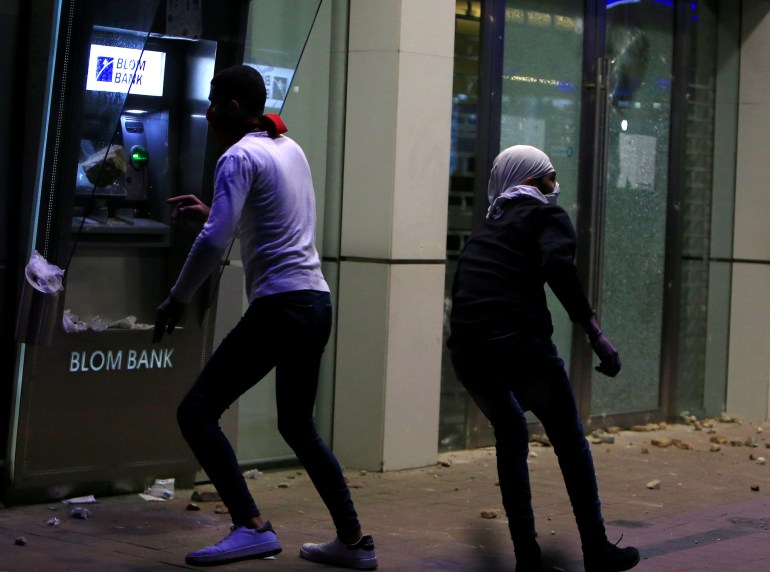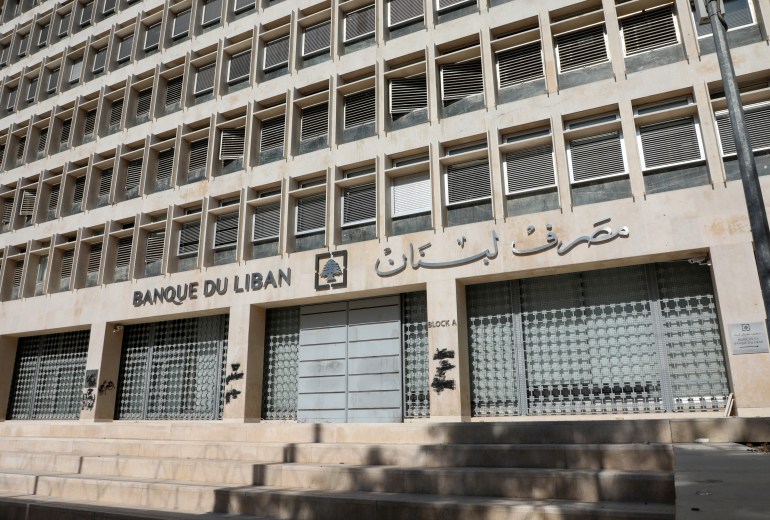Beirut, Lebanon – For more than two years, people in Lebanon with United States dollar accounts in the country’s banks have faced severe restrictions on withdrawals, as hard currency dried up and the value of the Lebanese pound plummeted. So when Lebanon’s central bank issued a directive last month more than doubling the exchange rate for Lebanese pound withdrawals on dollar deposits, chaos ensued.
In one bank, staff and security struggled to hold down the entrance door, as retired and off-duty soldiers barged through to withdraw savings at the more favourable rate. One off-duty soldier in military garb crawled under their legs to get inside.
While measures like the directive might temporarily assuage angry depositors whose life savings have been trapped in the country’s broken banks, experts say it is likely to make soaring inflation – which hit an annual rate of 174 percent in October – even worse. That’s because the central bank – the Banque du Liban – may print more pounds to keep up with the surge in demand.
But with elections scheduled for May, experts say such Band-Aid measures are likely to prevail, as politicians attempt to curry favour with angry voters while they drag their heels on meaningful reforms that could draw a line under an economic and financial crisis that has festered for more than two years and only shows signs of deepening in 2022.
Sick for years
The December central bank directive boosted the exchange rate on Lebanese pound withdrawals from dollar savings accounts from 3,900 pounds to $1 to 8,000 pounds to $1. But in a sign of just how desperate Lebanese are to free their savings, that rate is still a massive haircut on the current market value of the Lebanese currency.
Lebanon kicked off the new year with the value of the pound reaching a new all-time low of 30,000 to $1 on the parallel market. A month earlier, it was trading at 23,000 pounds to $1.
The latest downward spiral brings the value of the country’s monthly minimum wage to $22.50. But experts note, these are just the latest signs of chronic illness in an economy that’s been sick for years.
 A protester throws an object at an ATM machine of a bank during a demonstration against growing economic hardship in Sidon, Lebanon on April 29, 2020 [File: Ali Hashisho/Reuters]
A protester throws an object at an ATM machine of a bank during a demonstration against growing economic hardship in Sidon, Lebanon on April 29, 2020 [File: Ali Hashisho/Reuters]“It’s really how the country’s been run for over a decade,” Mike Azar, a senior financial adviser, tells Al Jazeera. “Now we’re feeling the effects of it more than before because we have fewer dollars to hide the impact of this mismanagement.”
Back in 1997, the Lebanese pound was officially valued at roughly 1,500 to $1 to keep post-civil war hyperinflation at bay and maintain investor confidence throughout the country’s reconstruction process.
But that official peg has remained in place even as the pound has crashed on the parallel markets, losing more than 95 percent of its value since October 2019.
Lebanon’s dual currency system ultimately failed because the country has long suffered from financial mismanagement and corruption, say experts. The economy came to rely almost entirely on tourism, banking, and remittances from the diaspora to generate revenue and bring in foreign currency.
In August 2019, with remittances drying up, the banks started slapping withdrawal limits on dollar accounts, triggering panic among depositors. By late October of that year, protests swept the country.
Things have only gotten worse since then. The COVID-19 pandemic gutted tourism. Then came the devastating Beirut Port blast in August 2020. All the while, Lebanon’s politics have remained paralysed, with successive governments failing to deliver a credible economic reform plan that is a prerequisite for unlocking billions of dollars in desperately needed financial aid, including an International Monetary Fund (IMF) bailout.
The country’s banking system is largely insolvent. The government estimates that losses in the lethargic financial sector since the onset of the currency crisis fall somewhere between $68bn and $69bn.
Jobs have vanished, thousands of businesses have failed, and savings-account values have evaporated, along with the country’s middle class. It’s estimated that three-quarters of the population now lives in poverty.
Businesses in Lebanon that have somehow managed to keep the doors open face a near-daily struggle to adjust their prices to a currency with no bottom in sight.
“It’s very difficult for businesses to price their goods and services in Lebanese pounds with the exchange rate being so volatile and no visibility into the future,” Azar tells Al Jazeera.
In the absence of real reform…
Since the onset of the financial crisis in 2019, Lebanon has adopted a handful of official and informal exchange rates, with the official pegged rate rendered futile. Even Banque du Liban Governor Riad Salameh thinks so.
Salameh was once heralded as a financial wizard. Now, a large chunk of the population condemns him for what they see as his financial mismanagement of depositors’ money and the country’s foreign reserves.
 The central bank building in Beirut, Lebanon [File: Mohamed Azakir/Reuters]
The central bank building in Beirut, Lebanon [File: Mohamed Azakir/Reuters]For his part, Salameh has deflected blame to the government for failing to step up with a financial reform plan.
The most dominant exchange rate in Lebanon is the parallel market rate, which expands and contracts based on political and economic developments and lacks transparency. The authorities have struggled to crack down on exchange offices using the opaque rate, and the central bank has struggled to convince them to adopt their regulated exchange rate platform, called Sayrafa.
With no viable currency stabilisation efforts afoot, and lack of oversight, financial adviser Michel Kozah told Al Jazeera Lebanon is caught in a “vicious circle”.
“The Sayrafa platform is throwing dollars away – these are depositors’ money,” Kozah said. “And even the banks have their own rates based on that platform. It’s crazy.”
In the absence of viable recovery and restructuring plans, the Lebanese authorities heavily rely on tourists over the summer and winter to bring hard currency into the country and Lebanese living abroad to wire dollars to their families to help pay the bills.
Meanwhile, the financial pressures on ordinary Lebanese have only intensified as the government has gone broke.
Since last summer, the central bank has gradually lifted subsidies on wheat, gasoline, fuel and medicines. Topping up a petrol tank now costs the equivalent of the monthly minimum wage.
“They are just delaying things, and I think the central bank circulars are to please angry depositors before the [parliamentary] elections [in May],” Kozah said. “But what you need is a full package of reforms with an IMF plan at the end of the day.”
Azar echoed similar sentiments, adding that strong social protections and job creation could have offset the negative impact of inflation if a programme had been implemented early on in the crisis.
“To the extent any of the needed reforms cause hardship on certain segments of society, such as increasing electricity tariffs or lifting other subsidies, there would be a social safety net and other support provided as part of the plan,” he said. “You would also have external financial support, economic growth, and jobs, which would increase people’s purchasing power.”
The worst isn’t over yet
An IMF delegation will visit Beirut in less than two weeks to continue talks, though the Lebanese government has struggled to implement any key economic and administrative reforms, including a forensic audit of the central bank, a capital controls law, and a ration card programme to offset the impact of lifting subsidies.
And Kozah says Lebanon hasn’t seen the worst of inflation yet. About half a million workers in the public sector and security agencies are still compensated at the official pegged exchange rate, and the Lebanese authorities intend to continue gradually lifting subsidies as the central bank’s reserves run dry.
“They will have to adjust public sector salaries. They won’t be paid to the dollar, but they will inevitably be paid at a rate where they can afford to live,” Kozah explained. “The dollar will reach 50,000 pounds – if not more.”
Azar even questions if the volatile Lebanese pound is viable as a currency anymore, given luxury retailers have started to only accept payment in US dollars.
“Even if we wake up tomorrow, and the government puts a plan together and executes it correctly, is it reasonable to expect people will put their life savings in pounds in Lebanese banks again?” he asked. “At this point, after more than two years of delays in implementing a single reform and the resulting total collapse of the lira [Lebanese pound], it’s difficult to see a viable path to restoring confidence in the lira, which is a precondition to maintaining its utility as a functional currency.”
Lebanon’s crippled economy hobbles into new year - Al Jazeera English
Read More
No comments:
Post a Comment